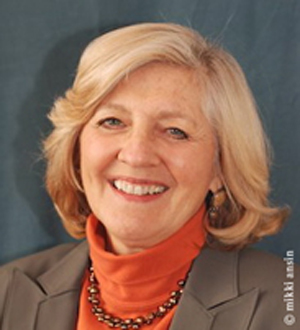
Ellen Goodman (b. April 11, 1941) is an American journalist and syndicated columnist who won a Pulitzer Prize in 1980. She is also a speaker and commentator, and was one of the first women in the United States to discuss women's rights openly. (Click here for full Wikipedia article)
-----
At times it seems that the media have become the mainstream culture in children's lives. Parents have become the alternative. Americans once expected parents to raise their children in accordance with the dominant cultural messages. Today they are expected to raise their children in opposition to it.
Civility, it is said, means obeying the unenforceable.
I began to realize that life is a growth stage I'm going through.
I have never been especially impressed by the heroics of people who are convinced they are about to change the world. I am more awed by those who struggle to make one small difference after another.
I regard this novel as a work without redeeming social value, unless it can be recycled as a cardboard box.
If women can sleep their way to the top, how come they aren't there?
In journalism, there has always been a tension between getting it first and getting it right.
It's not just that American families have less time with their kids; it's that we have to spend more of this time doing battle with our own culture.
Most people do not consider dawn to be an attractive experience- unless they are still up.
My generation of women thought the women's movement would advance on two legs. With one, we would kick down the doors closed to us. With the other, we would walk through changing society for men and women. It turned out that it was easier to kick down the doors than to change society.
Normal is getting dressed in clothes that you buy for work and driving through traffic in a car that you are still paying for- in order to get to the job you need to pay for the clothes and the car, and the house you leave vacant all day so you can afford to live in it.
Once upon a time we were just plain people. But that was before we began having relationships with mechanical systems. Get involved with a machine and sooner or later you are reduced to a factor.
The average parent may, for example, plant an artist or fertilize a ballet dancer and end up with a certified public accountant. We cannot train children along chicken wire to make them grow in the right direction. Tying them to stakes is frowned upon, even in Massachusetts.
The central struggle of parenthood is to let our hopes for our children outweigh our fears.
The people often slandered as greedy geezers seem to have a perspective from their place in history. The elders in my family remember the Depression. The baby boomers remember dot-com boom and bust. We all have albums of best laid plans.
The things we hate about ourselves aren't more real than things we like about ourselves.
There's a trick to the Graceful Exit. It begins with the vision to recognize when a job, a life stage, a relationship is over- and to let go. It means leaving what's over without denying its value.
Traditions are the guideposts driven deep in our subconscious minds. The most powerful ones are those we can't even describe, aren't even aware of.
Values are not trendy items that are casually traded in.
We are told that people stay in love because of chemistry, or because they remain intrigued with each other, because of many kindnesses, because of luck... But part of it has got to be forgiveness and gratefulness.
We spend January 1st walking through our lives, room by room, drawing up a list of work to be done, cracks to be patched. Maybe this year, to balance the list, we ought to walk through the rooms of our lives... not looking for flaws, but for potential.
When speech is divorced from speaker and word from meaning, what is left is just ritual, language as ritual.
When we describe what the other person is really like, I suppose we often picture what we want. We look through the prism of our need.
When you live alone, you can be sure that the person who squeezed the toothpaste tube in the middle wasn't committing a hostile act.
Years ago, during a wave of crimes against women in Israel, a council of men asked Golda Meir to put a nighttime curfew on females. Meir said no. If men were the problem, she answered, let the council enforce a curfew against men.
You can fire your secretary, divorce your spouse, abandon your children. But they remain your co-authors forever.
You can teach someone who cares to write columns, but you can't teach someone who writes columns to care.
Categories: Ellen Goodman, Quotes of the day
![]() Subscribe
[Home]
[Commentwear]
[E-Mail KGB]
Subscribe
[Home]
[Commentwear]
[E-Mail KGB]
Older entries, Archives and Categories Top of page

















